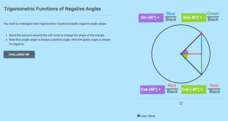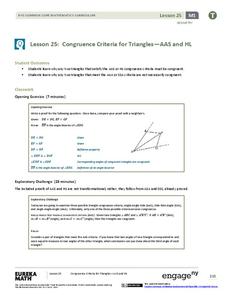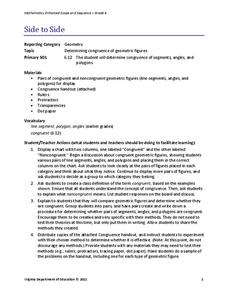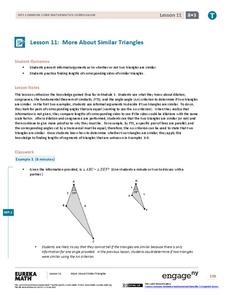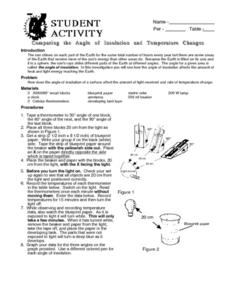CK-12 Foundation
Trigonometric Functions of Negative Angles
When is the trigonometric value of a negative angle the same as the positive angle? Pupils compare the values of trigonometric functions for different angles and their negatives. The interactive resource provides a visual display to make...
Math Mammoth
Measuring Angles
The first of two pages displays various angles as the measure of degrees of a circular arc. An explanation is written, and learners are asked to model each by holding up two pencils as the rays. The second page provides instruction on...
EngageNY
Congruence Criteria for Triangles—AAS and HL
How can you prove it? Guide classes through an exploration of two possible triangle congruence criteria: AAS and HL. Learners connect this criteria to those previous learned and also explore criteria that does not work. The lesson...
CK-12 Foundation
Pythagorean Theorem to Classify Triangles: Missing Angles
Learn to use the Pythagorean Theorem with non-right triangles. Pupils use the interactive to discover the relationship between the lengths of sides for acute and obtuse triangles. They compare the squares of the sides of the triangles to...
Curated OER
Angle Exploration and Classification
Students compare and contrast angles and identify them as acute, obtuse, right, or straight angles. They create rays and angles using uncooked spaghetti, read and discuss key vocabulary terms, and complete a variety of geometry worksheets.
Virginia Department of Education
Side to Side
Congruent figures: two figures that want to be just like each other. Individuals learn to distinguish between figures that are congruent and those that are not. Measuring the lengths of line segments and angles helps in this endeavor.
Illustrative Mathematics
Are These Right?
Is that a right triangle or a wrong triangle? Young mathematicians look at eleven different shapes and use a measuring tool of their choice to determine which triangles have right angles. Consider cutting out sets of the shapes to...
EngageNY
Base Angles of Isosceles Triangles
Build confidence in proofs by proving a known property. Pupils explore two approaches to proving base angles of isosceles triangles are congruent: transformations and SAS. They then apply their understanding of the proof to more complex...
Willow Tree
Ratios and Proportions with Congruent and Similar Polygons
Investigate how similar and congruent figures compare. Learners understand congruent figures have congruent sides and angles, but similar figures only have congruent angles — their sides are proportional. After learning the...
EngageNY
Unknown Angles
How do you solve an equation like trigonometry? Learners apply their understanding of trigonometric ratios to find unknown angles in right triangles. They learn the meaning of arcsine, arccosine, and arctangent. Problems include basic...
Virginia Department of Education
Special Right Triangles and Right Triangle Trigonometry
Right triangles are so special! Use special right triangles to discover the trigonometric ratios. Pairs construct special right triangles and find the values of the ratios of the sides. In the process, they discover the ratios stay the...
Math Solutions
Shape Sorting: Looking for Green!
Young mathematicians rotate, flip, and sort their way to an understanding of the different attributes of geometric figures. Using transparent yellow and blue shapes, children try to match congruent figures together to create...
Curated OER
Angles, Triangles, Quadrilaterals, Circles and Related
Young scholars classify angles. In this angles lesson, students explore the characteristics of angles, triangles, quadrilaterals and circles. They identify polygons and sing a classifying angles song. Young scholars participate in a...
101 Questions
Best Triangle
What makes an equilateral triangle equilateral? It turns out it's much more than just the side lengths! Learners analyze four different triangles to determine the best equilateral triangle. They create a formula that they later use to...
Curated OER
Investigating AAS
Students investigate the theorems of ASA, AAS, AAA and ASA. In this geometry lesson, students discuss the theorems of triangles and how it is used to solve for missing sides or angles. They review how two angles are formed by two rays...
Curated OER
Shapes Galore!
First graders explore two-dimensional shapes. Individually, children follow directions to draw shapes. Learners use shaving cream, geoboards, yarn, marshmallows, and toothpicks to create shapes. As a class, 1st graders brainstorm...
Curated OER
Angle-Side Relationships
Students calculate the different sides and angles of a triangle. In this geometry lesson, students use triangular properties to define the relationship between two triangle. They identify missing angles using the interior angle theorem.
EngageNY
The Angle-Angle (AA) Criterion for Two Triangles to Be Similar
What do you need to prove triangles are similar? Learners answer this question through a construction exploration. Once they establish the criteria, they use the congruence and proportionality properties of similar objects to find...
Curated OER
Transformations in the Coordinate Plane
Your learners connect the new concepts of transformations in the coordinate plane to their previous knowledge using the solid vocabulary development in this unit. Like a foreign language, mathematics has its own set of vocabulary terms...
EngageNY
More About Similar Triangles
Determine whether two triangles are similar. The lesson presents opportunities for pupils to find the criterion needed to show that two triangles are similar. Scholars use the definition of similarity to find any missing side...
K-5 Math Teaching Resources
2-D Shape Cards
Add some visual support to your elementary geometry lessons with this set of printable shape cards. From triangles and squares to octagons and nanogons, this simple resource can be used in countless ways to develop children's knowledge...
Curated OER
Angle Insolation
In this science worksheet, students look for the answers that are related to the concept of insolation and measuring different angles.
Curated OER
Introducing Angles
Sixth graders identify, compare and interpret the characteristics of polygons and angles in order to meet spatial sense, geometry and measurement standards. They also sort shapes into three categories, polygons (regular and irregular)...
Curated OER
Leveled Problem Solving Special Pairs of Angles
In this special pairs of angles practice worksheet, students sharpen their problem solving skills as they solve 6 story problems.


